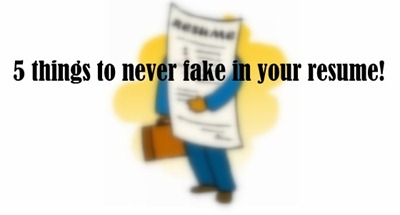5 Things You Should NEVER Fake On Your Resume
[Updated: July 29th 2014] While making your resume, have you ever experienced the temptation of adding a few extra digits to your previous remuneration package or a few personal skills that any HR person wouldn’t be able to cross check? Well, according to ‘Background Screening Trends of India’ survey, out of every 1,000 background screenings done in India, 96 were found to have discrepancies. This survey was provided by First Advantage, a global risk mitigation firm illustrated, reported Mint. And most of these discrepancies are found in the areas of a job seeker’s pay, designation and responsibilities, states ET.
“Commonest of all falsifications are showing better past remunerations, showing extended dates of past employment and mentioning fake jobs to cover gaps in employment history. Other falsifications that we have observed are boasting of past achievements, showing better titles and responsibilities handled, omitting earlier jobs to cover up bad employment history, falsifying reasons of leaving the previous jobs.” – N P S Sethi, VP, HR & Administration, Jindal Intellicom [Source]
While faking details may be extremely lucrative for some, be cautioned that it can land you in a soup, especially if you are applying for mid level or senior positions. HR professionals in India Inc are known to carry out heavy cross checking though references along with hired background checking for screening out fake resumes. Keeping this in mind, here are 5 areas amongst many others that you should never lie about, in your resume. 
Contents [hide]
Salary and Remuneration
Most job seekers lie about salary and bonus packages to apparently be able to better negotiate their future package. For HR, the logic of doing this is extremely fuzzy, considering that there are now stringent policies in place for HR professionals to get in touch with the candidate’s previous employees and cross check the numbers. While salary figures from contemporaries in the same industry are meant to be confidential and competitive, there are ways in ways HR personnel from both sides can engage to discuss a specific case. Make sure that case isn’t you!
Education and skills
Most job applicants in India take advantage of the fact that there is really no easy way to verify education certificates because of the lack of centralized databases in Indian colleges and universities. With a variety of deemed and self financed colleges on the rise, job applicants only get more leeway for faking certificate, fabricating degrees or covering up academic failures. HR carries out manual checks on certificates submitted and this can take a long time. Since many educational documents can be easily faked though technology there days, application procedures often give more emphasis to skill based tests to genuinely asses an applicant, reports WSJ India.
Job profiles
Many applicants tend to think that whatever content they put under skills and job responsibilities doesn’t matter because it is simply meant to make the resume ornamental. Who’s really going to bother to read what tasks you were given in your previous job? Well, the truth is that for junior positions it may or may not matter, but as you climb the corporate hierarchy, every single detail in your resume will come under the scanner. While fabricating such details for smaller positions may or may not be caught, it will immediately give the employer an idea that you can be easily influenced to get something done the wrong way.
Employment tenures and gaps
Shiv Agrawal, CEO of ABC Consultants tells ET that exaggeration and hiding employment gaps are two things that make for 50 to 60 percent of fabricated resumes. Job applicants typically lengthen their employment tenure in a well known company that they might have worked with and freshers fake internships left, right and centre. Job seekers often cover up for a break in between jobs or tweak their graduation dates in order to cover up for a failure. Nipa Modi, Chief Marketing Officer at CRP Technologies India Pvt. tells Wall Street Journal India that this happens a lot in India because gaps between two jobs are not considered normal. While in the West, applicants often mention why they took a break and what they achieved in their time off that enhanced their career.
Designations and titles
If you’re thinking that notching yourself up from a Junior Sales assistant to a Sales Assistant in your resume will hardly catch the attention of an HR professional, you’re grossly mistaken. Companies look at falsifications like this as a slur on their brand value and do not choose to recruit such employees even if they have a fantastic academic background. Today you manipulated a designation, tomorrow you’ll manipulate a profit report. Where does the buck stop?
“Discrepancies in a CV reflect the candidate’s poor value system.” – Nihar Ranjan Ghosh, Senior VP, HR, RPG Retail [Source]
Would you really want to build a career on a poor value system?
